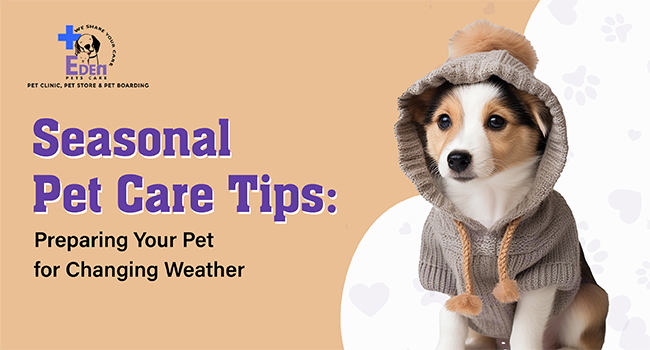
Nov 24 2023
Published By : Eden Pets Care
Seasonal Pet Care Tips: Preparing Your Pet for Changing Weather
As the seasons shift, so do the needs of our beloved pets. Just as we adapt our lifestyle and routines to the changing weather, it's crucial to adjust the care we provide for our furry friends.
This guide offers essential tips for keeping your pet comfortable, safe, and healthy as the weather changes.
Understanding Your Pet's Needs in Different Seasons
Spring and Summer Care:
- Beat the Heat : Ensure your pet has access to plenty of fresh water and shade. Overheating can be dangerous, so watch for signs of heatstroke, including excessive panting and lethargy.
- Flea and Tick Prevention : These pests are more prevalent in warmer months. Regularly use preventive treatments to keep these parasites at bay.
- Safe Outdoor Activities : Limit strenuous activities during peak heat hours. Early morning or late evening walks are preferable.
Fall and Winter Care :
- Warmth and Comfort : Provide your pet with a warm, cozy place away from drafts. Short-haired breeds might need extra layers during walks.
- Skin and Paw Care : Cold weather can dry out your pet's skin and damage their paws. Consider pet-safe moisturizers and protective paw wear.
- Indoor Exercise : Keep your pet active indoors with toys and playtime, especially when it's too cold to go outside.
Diet and Nutrition Adjustments
Seasonal Dietary Changes:
- Hydration in Summer : Increase water intake during hot months. Adding wet food to their diet can also help with hydration.
- Winter Caloric Needs :Some pets may require more calories in the winter to maintain body heat, while indoor pets with reduced activity might need less.
Health Check-Ups and Vaccinations
Regular vet visits are vital for maintaining your pet's health throughout the year. Seasonal changes can bring different health challenges:
- Spring/Summer : Check for heartworm and update vaccinations.
- Fall/Winter :Discuss any concerns about arthritis or mobility issues exacerbated by colder weather.
Grooming for Seasonal Comfort
Adapting Grooming Routines:
- Summer : Consider a shorter haircut for long-haired breeds to prevent overheating.
- Winter : Regular brushing helps keep the coat fluffy and insulating.
Mental and Emotional Well-being
Changing seasons can affect your pet's mood and behavior:
- Increased Daylight : Longer days in spring and summer can boost your pet's energy levels.
- Shorter Days : Less daylight in fall and winter can lead to lethargy. Keep them engaged with interactive toys and indoor games.
Preparing for Seasonal Allergies
Just like humans, pets can suffer from seasonal allergies. Watch for symptoms like itching, sneezing, or ear infections, and consult your vet for appropriate treatments.
Conclusion
Adapting your pet care routine to accommodate seasonal changes is essential for their well-being. By staying vigilant about their dietary needs, health check-ups, grooming, and emotional health, you can ensure your pet remains happy and healthy all year round.
Remember, each pet is unique, so it's important to tailor these tips to your pet's specific needs and consult your veterinarian for personalized advice. With these seasonal care strategies, you're well-equipped to provide the best care for your pet, no matter what the weather brings.

